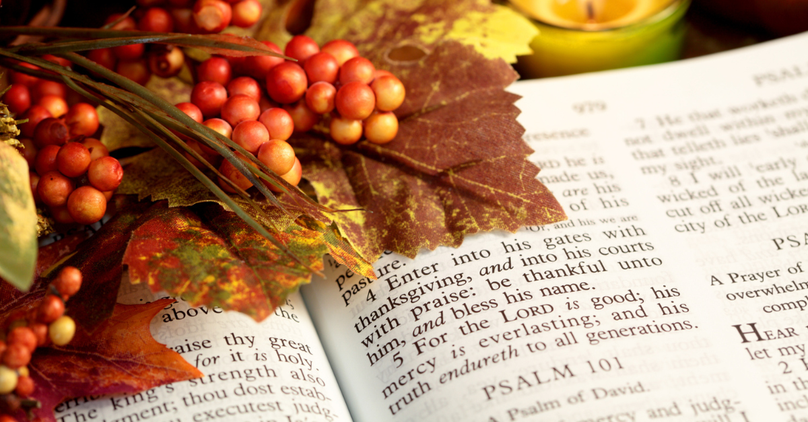
There’s a special feeling that arrives with the first days of fall. The air cools, leaves turn bright colors, and the world prepares for rest. This season of harvest and Thanksgiving is a natural time to take a break to reflect on your blessings and develop the habit of practicing gratitude. The Bible features timeless truths that can change your perspective so you can notice and appreciate the blessings God is constantly pouring into your life. Here are 7 Bible verses to inspire gratitude this fall.
Photo Credit: ©Getty Images/ cstar55

1. “Rejoice always, pray continually, give thanks in all circumstances; for this is God’s will for you in Christ Jesus.” - 1 Thessalonians 5:16-18:
It’s easy to feel grateful when life is going well, but what about when it’s difficult? This verse isn’t suggesting that we must be thankful for painful things. Instead, it calls us to give thanks in any circumstances, because our loving God is always with us and helping us, no matter what. Our gratitude should be based on God’s unchanging character rather than on changing situations. Giving thanks in all circumstances involves thanking God for faithfully being with us and giving us the strength we need in every situation. This verse highlights that gratitude isn’t just an emotion we can only feel in good circumstances, but a choice we make in faith to declare that God is good even when life in this fallen world is not. When we encounter a frustrating situation (such as a traffic jam, a difficult conversation, or some disappointing news), we can try to wait before reacting. Then, we can take a deep breath and find three blessings we’re thankful for right then and there. These blessings could be as simple as the sun outside our windows, the coffee we drink while we work, or even the fact that God is giving us our next breath. Stopping before we react to think of three current blessings will help us respond with less stress than reacting, and train our minds to focus on what’s good in our lives.
Photo Credit: ©Getty Images/JulPo

2. “You care for the land and water it; you enrich it abundantly. The streams of God are filled with water to provide the people with grain, for so you have ordained it. You drench its furrows and level its ridges; you soften it with showers and bless its crops. You crown the year with your bounty, and your carts overflow with abundance.” - Psalm 65:9-11:
This Psalm describes our Creator’s close involvement with creation. God cares for the land, watering it and blessing its crops. These verses recognize that while farmers work the land, the ultimate harvest is a gift from God. The rain, the sun, and the life within seeds express God’s generous provision. We all have “harvests” in our lives, like successful projects or personal milestones we reach. We put in the effort to achieve those goals, but God sends us many gifts to help our work result in good harvests: the talents we have, the opportunities that come our way, and the strength we need to persevere. While we’re partners in the work, God is the ultimate source of all abundance. It can help to reflect regularly on a recent good “harvest” in our lives and consider the effort we put in to achieve it, plus all the ways God provided for us (such as by giving us strengths, support from others, and timing that worked out perfectly). The more we see the wonderful partnership between our work and God’s grace, the more we can be inspired to be grateful.
Photo credit: © Unsplash/Timothy Meinberg

3. “And whatever you do, whether in word or deed, do it all in the name of the Lord Jesus, giving thanks to God the Father through him.” - Colossians 3:17:
Fall is an especially busy season. We can transform the most ordinary tasks – like answering emails, doing laundry, and grocery shopping – into acts of gratitude. Doing them “in the name of the Lord Jesus.” Doing so involves approaching our work with thankfulness for the opportunities God gives us. For example, if we’re cooking dinner, we can do so with a grateful awareness that God has given us the ability to buy delicious and nutritious food and a family to enjoy the meal with us. When we shift our perspective this way, we can live lifestyles of gratitude that honor God and encourage us regularly. Our tasks will no longer be boring. Instead, every time we thank God while doing a task, that will be a new opportunity for us to remember our blessings. We can even start our tasks with prayer before we start, offering our efforts on that task as an act of service to God. The more we do our tasks with gratitude, the more mindful we become of the blessings connected to them.
Photo Credit: ©Getty Images/JulPo

4. “For our light and momentary troubles are achieving for us an eternal glory that far outweighs them all. So we fix our eyes not on what is seen, but on what is unseen, since what is seen is temporary, but what is unseen is eternal.” - 2 Corinthians 4:17-18:
Fall leaves change colors quickly and then fade and fall to the ground, reminding us that our current circumstances are temporary. If our gratitude is tied to temporary situations, it will be fragile. This passage encourages us to focus on what is unseen and eternal. When we focus on what has eternal value, we can enjoy the perspective of appreciating what truly matters most. This eternal perspective allows us to feel gratitude even in seasons of letting go, because we know that the best is yet to come. We can take wonderful walks in nature and notice how the leaves change on the trees around us. Then, we can find a particularly beautiful leaf, pick it up, and thank God for its temporary beauty while thanking God for the eternal, unseen blessings in our lives, such as God’s love, the forgiveness and grace God gives us, and the promise of heaven.
Photo Credit: ©Getty Images/Anita Kot

5. “This is the day the Lord has made; let us rejoice and be glad in it.” - Psalm 118:24:
During fall, we have many opportunities to celebrate – at festivals, on nature walks, and more. But too often, we see a new day not as a gift, but as a series of obligations in our schedules. This powerful verse reminds us that each day is a gift from God. God has made this day that we’re living, so it’s tremendously valuable. The verse describes our response to such a valuable gift: “let us rejoice and be glad in it.” We have a choice. Either we can see the day through a lens of stress, or we can see it through a lens of joy, which leads us to gratitude. It’s possible to choose joy in any circumstance because joy comes from our relationships with God and doesn’t depend on our circumstances, like happiness does. When we choose to rejoice and be glad, we look for the many blessings God pours into our day, despite the challenges we face in this fallen world. We choose to notice God’s blessings and appreciate them. That gives us something to celebrate every single day. We can build this habit by reciting Psalm 118:24 soon after we wake up each morning. Before we even think about our schedules, we can think of this verse or even say it out loud like a declaration to ourselves: “This is the day the Lord has made; I will rejoice and be glad in it.” Then, as we prepare for the day ahead, we can find one blessing to be grateful for right then and there, such as a morning greeting from a family member or pet. By focusing on joyful gratitude right from the start of each day, we can carry a positive mindset into the rest of our day.
Photo Credit: ©Getty Images/Anton Petrus

6. “Praise the Lord, my soul, and forget not all his benefits – who forgives all your sins and heals all your diseases, who redeems your life from the pit and crowns you with love and compassion, who satisfies your desires with good things so that your youth is renewed like the eagle’s.” - Psalm 103:2-5:
When our fall schedule is keeping us busy, we can be so preoccupied with what we need God to do for us now that we lose sight of the countless times God has already helped us. The psalmist understands this, so he gives his own soul a command: “Forget not!” These verses urge us to fight against worrying by recalling God’s past faithfulness. Remembering how God has provided for us, healed us, and forgiven us in the past builds our faith to trust God with our present and future. “Remembrance Jar” practices can help us do so. Each evening this fall, we can take a few minutes to recall one specific “benefit” from God that day, write it on a small piece of paper, and put it into a jar. We can thank God for an answered prayer, an unexpected kindness from a stranger, the beauty of fall leaves, and much more. We can just write it down, date it, and place it in the jar. Then, on a hard day or Thanksgiving, we can pour out the contents and read through a record of God’s faithfulness in our lives.
Photo credit: ©GettyImages/Milko

7. “I am not saying this because I am in need, for I have learned to be content whatever the circumstances. I know what it is to be in need, and I know what it is to have plenty. I have learned the secret of being content in any and every situation, whether well fed or hungry, whether living in plenty or in want. I can do all this through him who gives me strength.” - Philippians 4:11-13:
These verses highlighting choose joy in any circumstances can powerfully encourage us as we deal with the frequent messages of comparison and dissatisfaction we hear, especially during the fall holiday season with all of its commercialism. The apostle Paul wrote these words from a prison cell. His contentment was not based on having everything he wanted. Instead, it was based on his relationship with God. Being content helps us be more grateful. It’s nearly impossible to be grateful for what we have if our minds are fixated on what we don’t have. Paul’s secret to being content was that his inner peace was disconnected from his external situation. We can change our focus from the horizontal (comparing our lives to others) to the vertical (focusing on how God will give us everything we truly need). When we find value and security from our relationships with God, we can be content because we can see that we don’t need any more. A contentment challenge for a weekend can help us become more content and grateful. For a full weekend, we can try to catch ourselves comparing our lives with other people’s lives. For example, if we find ourselves scrolling through social media and feeling envious, we can immediately put our phones down. Then, instead of dwelling on how we wish we had someone else’s circumstances, we can name something specific that we currently have and appreciate. This can help us break the habit of comparison and start practicing gratitude more.
So, this fall, let’s choose to practice gratitude. Doing so won’t eliminate our problems, but it will transform our perspective so we can find the strength to overcome them. May this fall be a season where we notice and appreciate our blessings in every part of our lives!
Photo credit: ©GettyImages/OKrasyuk
Originally published Friday, 19 September 2025.










